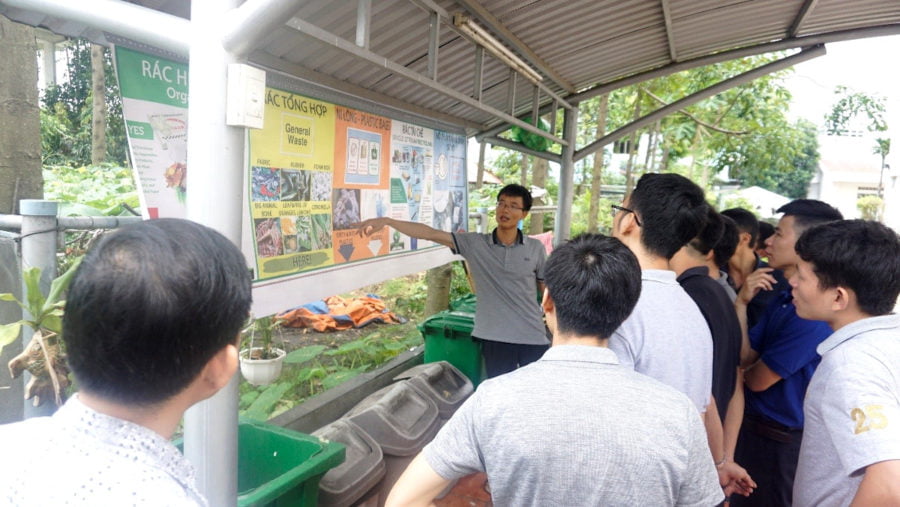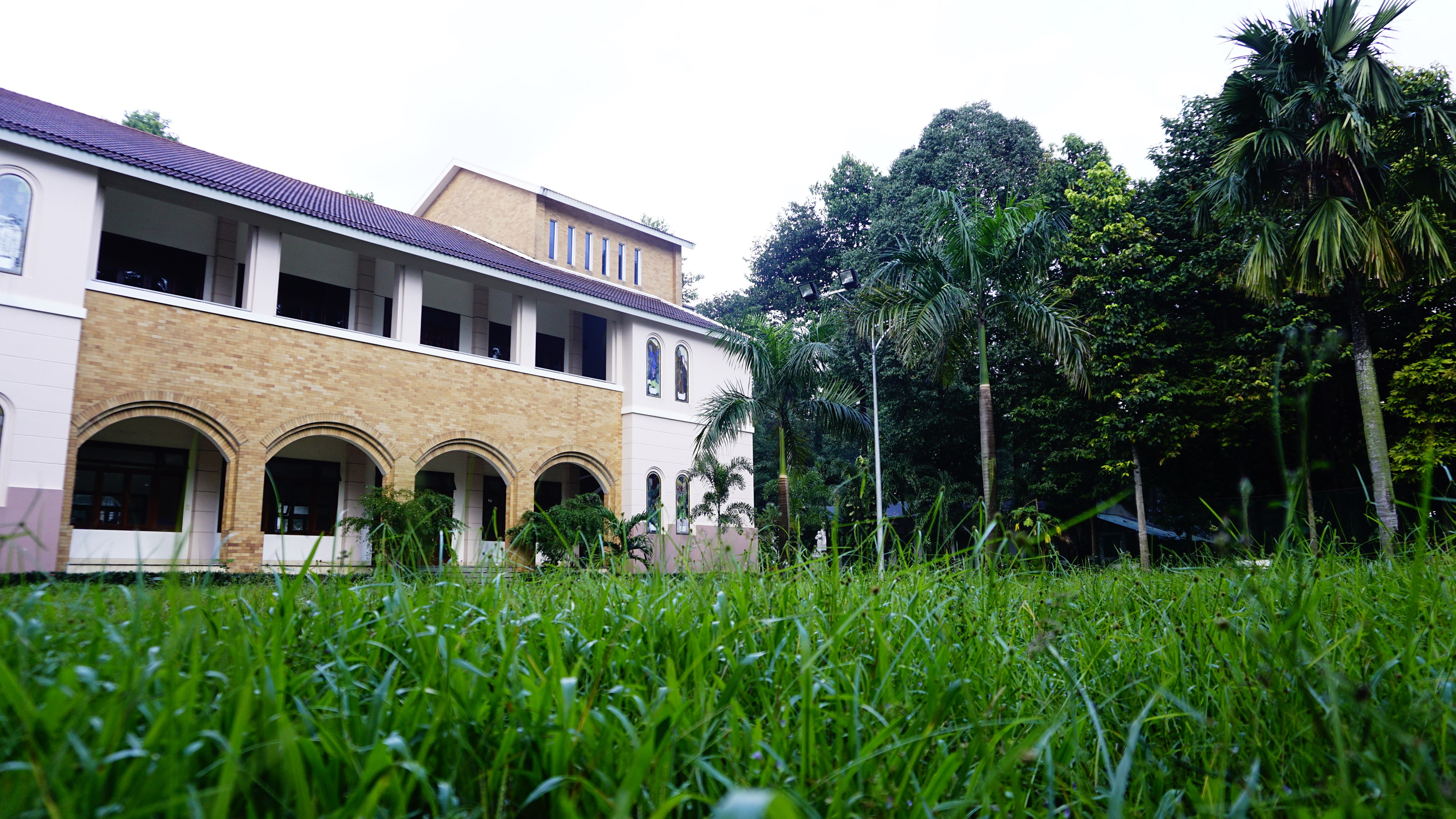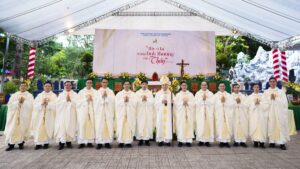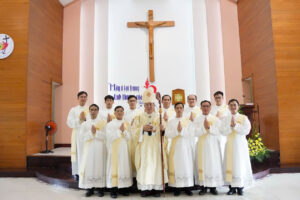
Inspired by Pope Francis’ encyclical, Laudato si’, and Fr General Arturo Sosa’s letter to the Jesuits on the four Universal Apostolic Preferences (UAPs), formators and scholastics at St Joseph Jesuit Scholasticate (SJJS) in Vietnam made a commitment and took concrete steps to protect the environment and promote environmental awareness. Among the activities we started include segregating waste, reducing plastic use, conserving electricity and growing trees and vegetables.Vietnam is one of Asia’s five worst plastic polluters. The majority of solid waste is either incinerated or dumped in landfills. Worse, garbage and plastic are often thrown into rivers or end up in the slums. SJJS is making changes, starting with our behaviour and implementing a policy of reduce, reuse and recycle.Surely, changing throw-away habits cannot be done at once, but doing small deeds every day can help. Since it is our behaviour that threatens natural habitats and ecosystems, we have the power to at least minimise–if not completely stop–environmental pollution. Our positive actions may catalyse others to change their attitudes as well.

Scholastics are encouraged to buy reusable bottles, bags and cups, and at the same time to reduce buying paper towels, single use plastic bottles and plastic bags. These past months we have been planting trees and growing flowers as a means of strengthening community life, in addition to creating green spaces in an otherwise concrete jungle and promoting an eco-friendly lifestyle. Trees do not only provide oxygen but also help to clean the air by absorbing pollutants generated by the factory next to our residence.Excessive use of energy, which is generated from the burning of fossil fuels, is a major contributor to global warming. We use ceiling fans, instead of air conditioners, which use up more energy. For us, sustainability is not a choice but a necessity.We have started growing our own vegetables in our backyard. We take care of them without using any chemicals or pesticides. Instead of throwing away our organic wastes, we compost them as nutrient-rich fertiliser for the soil in our gardens.

Taking responsibility for nurturing the growth of the plants and connecting with nature has had a therapeutic effect on SJJS residents. Besides the good health organic food brings to our bodies, the garden provides an opportunity for residents to engage in something productive and practical–and to think more about what they eat. In a world of instability, the garden provides residents with a sense of security, a place to reflect and an opportunity to practise patience.With the UAPs, ecology is central to the Jesuit mission. We strive to restore right relationships with creation and to respond to ecological or environmental challenges, so as “to appreciate more deeply our covenant with creation” (General Congregation 35, Decree 3, #36). Sustainability is not an add-on to our mission and practice, but an integral part of who we are, how we manage our organisation and how we meet the needs of the community we serve.

We also aim to cultivate environmental awareness among students and to promote discernment on
magis in sustainability. Besides, these concrete actions are viewed as our individual contributions as Jesuits in promoting the sustainable development of human life. We hope that through our actions we can encourage our community members, volunteers, friends and other Jesuit communities to get more involved in ecological protection.
 Scholastic Joseph Trần Ngọc Huynh SJ is a second year Philosophy student at St Joseph Jesuit Scholasticate.
Scholastic Joseph Trần Ngọc Huynh SJ is a second year Philosophy student at St Joseph Jesuit Scholasticate. Source: jcapsj.org
 Inspired by Pope Francis’ encyclical, Laudato si’, and Fr General Arturo Sosa’s letter to the Jesuits on the four Universal Apostolic Preferences (UAPs), formators and scholastics at St Joseph Jesuit Scholasticate (SJJS) in Vietnam made a commitment and took concrete steps to protect the environment and promote environmental awareness. Among the activities we started include segregating waste, reducing plastic use, conserving electricity and growing trees and vegetables.Vietnam is one of Asia’s five worst plastic polluters. The majority of solid waste is either incinerated or dumped in landfills. Worse, garbage and plastic are often thrown into rivers or end up in the slums. SJJS is making changes, starting with our behaviour and implementing a policy of reduce, reuse and recycle.Surely, changing throw-away habits cannot be done at once, but doing small deeds every day can help. Since it is our behaviour that threatens natural habitats and ecosystems, we have the power to at least minimise–if not completely stop–environmental pollution. Our positive actions may catalyse others to change their attitudes as well.
Inspired by Pope Francis’ encyclical, Laudato si’, and Fr General Arturo Sosa’s letter to the Jesuits on the four Universal Apostolic Preferences (UAPs), formators and scholastics at St Joseph Jesuit Scholasticate (SJJS) in Vietnam made a commitment and took concrete steps to protect the environment and promote environmental awareness. Among the activities we started include segregating waste, reducing plastic use, conserving electricity and growing trees and vegetables.Vietnam is one of Asia’s five worst plastic polluters. The majority of solid waste is either incinerated or dumped in landfills. Worse, garbage and plastic are often thrown into rivers or end up in the slums. SJJS is making changes, starting with our behaviour and implementing a policy of reduce, reuse and recycle.Surely, changing throw-away habits cannot be done at once, but doing small deeds every day can help. Since it is our behaviour that threatens natural habitats and ecosystems, we have the power to at least minimise–if not completely stop–environmental pollution. Our positive actions may catalyse others to change their attitudes as well. Scholastics are encouraged to buy reusable bottles, bags and cups, and at the same time to reduce buying paper towels, single use plastic bottles and plastic bags. These past months we have been planting trees and growing flowers as a means of strengthening community life, in addition to creating green spaces in an otherwise concrete jungle and promoting an eco-friendly lifestyle. Trees do not only provide oxygen but also help to clean the air by absorbing pollutants generated by the factory next to our residence.Excessive use of energy, which is generated from the burning of fossil fuels, is a major contributor to global warming. We use ceiling fans, instead of air conditioners, which use up more energy. For us, sustainability is not a choice but a necessity.We have started growing our own vegetables in our backyard. We take care of them without using any chemicals or pesticides. Instead of throwing away our organic wastes, we compost them as nutrient-rich fertiliser for the soil in our gardens.
Scholastics are encouraged to buy reusable bottles, bags and cups, and at the same time to reduce buying paper towels, single use plastic bottles and plastic bags. These past months we have been planting trees and growing flowers as a means of strengthening community life, in addition to creating green spaces in an otherwise concrete jungle and promoting an eco-friendly lifestyle. Trees do not only provide oxygen but also help to clean the air by absorbing pollutants generated by the factory next to our residence.Excessive use of energy, which is generated from the burning of fossil fuels, is a major contributor to global warming. We use ceiling fans, instead of air conditioners, which use up more energy. For us, sustainability is not a choice but a necessity.We have started growing our own vegetables in our backyard. We take care of them without using any chemicals or pesticides. Instead of throwing away our organic wastes, we compost them as nutrient-rich fertiliser for the soil in our gardens. Taking responsibility for nurturing the growth of the plants and connecting with nature has had a therapeutic effect on SJJS residents. Besides the good health organic food brings to our bodies, the garden provides an opportunity for residents to engage in something productive and practical–and to think more about what they eat. In a world of instability, the garden provides residents with a sense of security, a place to reflect and an opportunity to practise patience.With the UAPs, ecology is central to the Jesuit mission. We strive to restore right relationships with creation and to respond to ecological or environmental challenges, so as “to appreciate more deeply our covenant with creation” (General Congregation 35, Decree 3, #36). Sustainability is not an add-on to our mission and practice, but an integral part of who we are, how we manage our organisation and how we meet the needs of the community we serve.
Taking responsibility for nurturing the growth of the plants and connecting with nature has had a therapeutic effect on SJJS residents. Besides the good health organic food brings to our bodies, the garden provides an opportunity for residents to engage in something productive and practical–and to think more about what they eat. In a world of instability, the garden provides residents with a sense of security, a place to reflect and an opportunity to practise patience.With the UAPs, ecology is central to the Jesuit mission. We strive to restore right relationships with creation and to respond to ecological or environmental challenges, so as “to appreciate more deeply our covenant with creation” (General Congregation 35, Decree 3, #36). Sustainability is not an add-on to our mission and practice, but an integral part of who we are, how we manage our organisation and how we meet the needs of the community we serve. We also aim to cultivate environmental awareness among students and to promote discernment on magis in sustainability. Besides, these concrete actions are viewed as our individual contributions as Jesuits in promoting the sustainable development of human life. We hope that through our actions we can encourage our community members, volunteers, friends and other Jesuit communities to get more involved in ecological protection.
We also aim to cultivate environmental awareness among students and to promote discernment on magis in sustainability. Besides, these concrete actions are viewed as our individual contributions as Jesuits in promoting the sustainable development of human life. We hope that through our actions we can encourage our community members, volunteers, friends and other Jesuit communities to get more involved in ecological protection.  Scholastic Joseph Trần Ngọc Huynh SJ is a second year Philosophy student at St Joseph Jesuit Scholasticate. Source: jcapsj.org
Scholastic Joseph Trần Ngọc Huynh SJ is a second year Philosophy student at St Joseph Jesuit Scholasticate. Source: jcapsj.org









